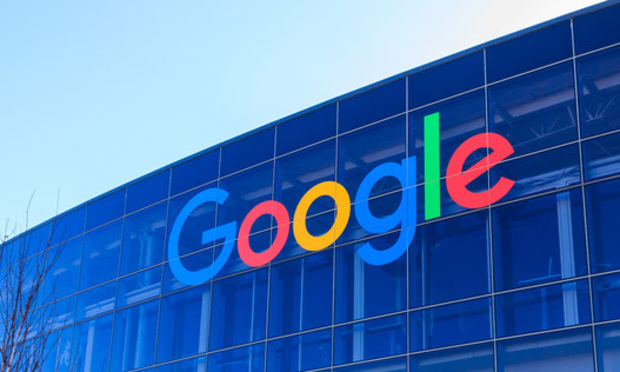Amici Line Up to Weigh in on Google Settlement at SCOTUS Challenging Cy Pres in Class Actions
Amicus briefs from the Chamber, 31 state AGs, and others are flowing in, in advance of an Oct. 31 U.S. Supreme Court argument weighing administration of cy pres funds in class settlements.
September 05, 2018 at 08:09 PM
7 minute read
The original version of this story was published on National Law Journal

A case before the U.S. Supreme Court challenging application of the cy pres doctrine in class action settlements has attracted a flurry of amicus briefs on both sides—and the arguments are all over the map.
Ted Frank, the director of litigation at the Center for Class Action Fairness at the Competitive Enterprise Institute, is asking the Supreme Court to overturn a settlement with Google that paid $5.3 million to six nonprofits, $2.1 million to plaintiffs lawyers and nothing to the class. In his opening brief, he argued that settlements made up exclusively of cy pres funds—which is money paid by the defendant that goes to third parties—violate Rule 23 of the Federal Rules of Civil Procedure because they deprive the class of any benefits.
Frank received a lot of amicus support from groups like Lawyers for Civil Justice and the Manhattan Institute—even the guitarist from punk rock band Dead Kennedys. Attorneys general in 19 states, including Texas and Georgia, filed a supporting brief that labeled cy pres-only settlements the “worst possible outcome for consumers.” (Attorneys general in 12 other states, including California, Connecticut and New York, filed a competing brief on Wednesday explaining that several states had laws permitting cy pres in class actions.)
But Frank also got opposition—and not just from the plaintiffs in the case and Google, who defended the settlement in briefs filed last week. Plaintiffs, who on Wednesday filed a motion requesting that Jeffrey Lamken of MoloLamken in Washington, D.C., make separate arguments from Google next month, wrote that Rule 23 does not prohibit cy pres funds. Google, represented by Donald Falk, a San Francisco partner at Mayer Brown, called cy pres a “valuable tool” for low-value settlements in which notifying class members would be infeasible and administrative costs would swallow up the fund.
Several other groups filed amicus briefs on Wednesday supporting the Google settlement. Those included Public Citizen, the National Consumer Law Center and 20 law professors, including Harvard Law School's William Rubenstein, who insisted that cy pres-only settlements are rare.
Then there's a raft of amicus briefs that took no sides in the case but still had a lot to say about cy pres funds. Those groups, such as the U.S. Chamber of Commerce, the American Bar Association and the U.S. government, bring up a host of other arguments: constitutional concerns, legal aid, class certification problems and standing issues.
Frank's reply to the briefs is due Sept. 28, and oral arguments are set to take place Oct. 31.
Cy pres-only settlements arise in class actions when the lawyers and the judge deem it prohibitive, due to cost or ability, to provide payouts to class members. Those circumstances are more common in cases involving the tech sector, in which millions of people could be class members. The case before the Supreme Court, for example, alleged that Google violated the privacy rights of its customers by disclosing search records using referral headers. There were 129 million people in the class. After subtracting attorney fees and the costs of administering the $8.5 million settlement, each class member stood to get about 4 cents.
As a result, settlement funds in those cases sometimes end up going to third parties. In the Google settlement, the cy pres recipients included Harvard's Berkman Klein Center for Internet & Society, the Stanford Center for Internet and Society and the Center for Information, Society and Policy at the Illinois Institute of Technology's Chicago-Kent College of Law—alma maters of some of the plaintiffs attorneys. Google also donated to at least one of the recipients.
The U.S. Court of Appeals for the Ninth Circuit approved the deal last year.
Frank, in his brief, argued that cy pres is a “perverse incentive” for plaintiffs' lawyers to drum up large attorney fee requests based on a percentage of the settlement fund.
“Cy pres is one of many tools that a plaintiff's attorney has for self-dealing and to exaggerate the value of a settlement to maximize their own attorney's fees and their own share of the settlement value,” Frank said.
In his brief, Frank insisted that the Supreme Court impose more scrutiny on such settlements, citing decisions in other cases, such as a 2017 ruling in which the U.S. Court of Appeals for the Seventh Circuit called a case over Subway sandwich lengths “utterly worthless.”
His argument focused on Rule 23's requirement that class action settlements be “fair, reasonable, and adequate.”
“It is not fair or reasonable under Rule 23(e) for class attorneys to arrogate millions for themselves and nothing for their clients,” he wrote.
But several outside groups had additional arguments.
The chamber, whose members include Google, took no position on the case. But its amicus brief, written by King & Spalding's Ashley Parrish, called on the Supreme Court to impose strict standards on cy pres settlements, which were “symptomatic of a much deeper problem” of an increasing number of cases with class members who weren't injured. Approving settlements in such cases “threatens to invite even more meritless class actions, which, in turn, will inevitably yield more cy pres settlements,” according to the brief.
Then there's the Justice Department, which filed an amicus brief in the Google case but took no sides. Last year, U.S. Attorney General Jeff Sessions ended a Justice Department policy that required companies and banks to donate portions of settlement funds to charities or other third parties.
“Many of the principles underlying that decision are relevant to the question presented here,” wrote Solicitor General Noel Francisco, who on Tuesday filed a motion asking the Supreme Court for separate argument time next month.
He is asking to remand the case. In his brief, Francisco wrote that there was “considerable doubt” about whether the case had standing under the Supreme Court's 2016 holding in Spokeo v. Robins. That ruling required a plaintiff to have an alleged “injury in fact” that is both “concrete” and “particularized.”
Other groups raised some of these arguments:
- Rules Enabling Act: Federal courts, with few exceptions, lacked authority to use cy pres funds for class action settlements under the Rules Enabling Act.
- Free speech: Cy pres violated free speech under the First Amendment.
- Standing: Neither the cy pres recipients nor the objector have standing in the case before the Supreme Court.
- Legal aid: A ruling striking down cy pres would threaten legal aid organizations that rely on that funding.
- Google's donors. Professional recording artists, including Ray Pepperell, former guitarist for the Dead Kennedys, challenged the choice of cy pres recipients in the case given Google's financial support of at least one of them. One of the most common cy pres recipients in cases involving Google is the Electronic Frontier Foundation, which, along with two other groups, filed a brief on Wednesday supporting the deal.
Read more:
SCOTUS Finally Takes a Cy Pres Case
This content has been archived. It is available through our partners, LexisNexis® and Bloomberg Law.
To view this content, please continue to their sites.
Not a Lexis Subscriber?
Subscribe Now
Not a Bloomberg Law Subscriber?
Subscribe Now
NOT FOR REPRINT
© 2025 ALM Global, LLC, All Rights Reserved. Request academic re-use from www.copyright.com. All other uses, submit a request to [email protected]. For more information visit Asset & Logo Licensing.
You Might Like
View All
Turning Over Legal Tedium to AI Requires Lots of Unglamorous Work on Front End
6 minute read
Legal Departments Dinged for Acquiescing to Rate Hikes That 'Defy Gravity'
4 minute read
FOMO Run Amok? Resolve of Firms Chasing AI Dreams Tested by Sky-High Costs
Trending Stories
- 1Courts Beginning to Set Standards for Evidence Relying upon Artificial Intelligence
- 2First-Degree Murder Charge May Not Fit Mangione Case
- 3Legal Tech's Predictions for Legal Ops & In-House in 2025
- 4SDNY US Attorney Damian Williams Lands at Paul Weiss
- 5Litigators of the Week: A Knockout Blow to Latest FCC Net Neutrality Rules After ‘Loper Bright’
Who Got The Work
Michael G. Bongiorno, Andrew Scott Dulberg and Elizabeth E. Driscoll from Wilmer Cutler Pickering Hale and Dorr have stepped in to represent Symbotic Inc., an A.I.-enabled technology platform that focuses on increasing supply chain efficiency, and other defendants in a pending shareholder derivative lawsuit. The case, filed Oct. 2 in Massachusetts District Court by the Brown Law Firm on behalf of Stephen Austen, accuses certain officers and directors of misleading investors in regard to Symbotic's potential for margin growth by failing to disclose that the company was not equipped to timely deploy its systems or manage expenses through project delays. The case, assigned to U.S. District Judge Nathaniel M. Gorton, is 1:24-cv-12522, Austen v. Cohen et al.
Who Got The Work
Edmund Polubinski and Marie Killmond of Davis Polk & Wardwell have entered appearances for data platform software development company MongoDB and other defendants in a pending shareholder derivative lawsuit. The action, filed Oct. 7 in New York Southern District Court by the Brown Law Firm, accuses the company's directors and/or officers of falsely expressing confidence in the company’s restructuring of its sales incentive plan and downplaying the severity of decreases in its upfront commitments. The case is 1:24-cv-07594, Roy v. Ittycheria et al.
Who Got The Work
Amy O. Bruchs and Kurt F. Ellison of Michael Best & Friedrich have entered appearances for Epic Systems Corp. in a pending employment discrimination lawsuit. The suit was filed Sept. 7 in Wisconsin Western District Court by Levine Eisberner LLC and Siri & Glimstad on behalf of a project manager who claims that he was wrongfully terminated after applying for a religious exemption to the defendant's COVID-19 vaccine mandate. The case, assigned to U.S. Magistrate Judge Anita Marie Boor, is 3:24-cv-00630, Secker, Nathan v. Epic Systems Corporation.
Who Got The Work
David X. Sullivan, Thomas J. Finn and Gregory A. Hall from McCarter & English have entered appearances for Sunrun Installation Services in a pending civil rights lawsuit. The complaint was filed Sept. 4 in Connecticut District Court by attorney Robert M. Berke on behalf of former employee George Edward Steins, who was arrested and charged with employing an unregistered home improvement salesperson. The complaint alleges that had Sunrun informed the Connecticut Department of Consumer Protection that the plaintiff's employment had ended in 2017 and that he no longer held Sunrun's home improvement contractor license, he would not have been hit with charges, which were dismissed in May 2024. The case, assigned to U.S. District Judge Jeffrey A. Meyer, is 3:24-cv-01423, Steins v. Sunrun, Inc. et al.
Who Got The Work
Greenberg Traurig shareholder Joshua L. Raskin has entered an appearance for boohoo.com UK Ltd. in a pending patent infringement lawsuit. The suit, filed Sept. 3 in Texas Eastern District Court by Rozier Hardt McDonough on behalf of Alto Dynamics, asserts five patents related to an online shopping platform. The case, assigned to U.S. District Judge Rodney Gilstrap, is 2:24-cv-00719, Alto Dynamics, LLC v. boohoo.com UK Limited.
Featured Firms
Law Offices of Gary Martin Hays & Associates, P.C.
(470) 294-1674
Law Offices of Mark E. Salomone
(857) 444-6468
Smith & Hassler
(713) 739-1250







